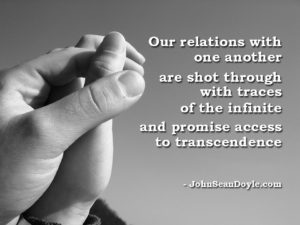It all started with an encounter. After a morning of ‘religious enthusiasm’, Martin Buber was visited by a young man. Buber was friendly and attentive, but says he was not there fully in spirit. Later, the philosopher and theologian discovered that the young man had been wrestling with something. He was looking for guidance or insight into an important life matter. To Buber’s dismay, not long thereafter, the man died in the war.
Buber explains, that while he answered the questions that the young man had asked, he had not heard the ones that were not asked. He did not meet the man with the sort of “presence” that says “nevertheless there is meaning.”
When face-to-face with another, how often do we miss the true human encounter? So often, we are too busy or distracted. We are absorbed in other matters. There are always goals or the things we are worried about. The report that must be finished. The mouse behind the cupboard. The relentless drip beneath the bathroom sink.
Then we come to that point in our lives when we question what we are doing. Day-after-day, plugging away in the office or down at the shop. We have so little time. It feels like it should be spent reducing suffering or increasing the tonnage of joy. Yet in the middle this longing, there are people all around us. People just like ourselves with hopes and concerns and trying to make sense of things. How often do we miss the questions they are not asking? The man in the next cube. The girl behind the counter at the coffee shop, that one with the sad black eyes.
The world is spinning and tilting and rocketing through space, and will always be too big to comprehend. We can never be sure of the choices we’ve made.
Yet while we cannot predict or grasp, we can embrace. There is no need to wrestle over something “higher”. There is nothing to chase, and nothing chasing us. The simple magnificence is right there. Our relations with one another are shot through with traces of the infinite and promise access to transcendence. We can listen with the soft attentiveness of an open heart. When we do, a different sort of understanding happens. “Simple immediacy and togetherness”, writes Buber, “is the most effective form of action. More powerful and more holy than all writing is the presence of a man who is simply and directly there.”
References
Buber, Martin. “Dialogue.” Between Man and Man. Rutledge, 1947. 13. Print.
© 2017, John A. Doyle, Jr., All Rights Reserved.







Sean,
Brilliantly written. I know I miss those moments of connection with others because I’m so caught up in something else. And linking it to our desire to do something grander while we miss what is in front of us is an important insight and a wake-up call for me. Thank you.
Scott
Thanks Scott. We all need those reminders to keep one foot on the ground and stay wholly and honestly connected to those around us.
I really appreciate this piece Sean. “How often do we miss the questions they are not asking?”. Perhaps even if all of us don’t have quite the talent Buber did for seeing into ‘Thou’ ‘s world, we can still ‘be with them’.
Thanks Corey. I appreciate your thoughts and the way you are always contributing to community. Some people are are wired in a way that makes them more receptive. But I do think that if we can maintain that “presence” we will be surprised at how often we do hear those unspoken questions.